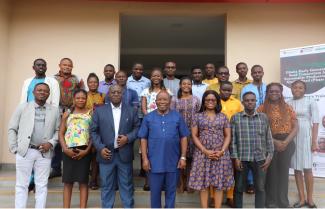
The West Africa Centre for Crop Improvement (WACCI), University of Ghana, in collaboration with National Seed Trade Association of Ghana (NaSTAG) , Council for Scientific and Industrial Research - Savanna Agricultural Research Institute (CSIR-SARI), and Council for Scientific and Industrial Research- Crops Research Institute (CSIR-CRI) held a two-day Seed Growers Training Workshop from August 13-14, 2024, in Koforidua. The workshop is part of the Ghana Early Generation Seed (EGS) Consortium for Sustainable Production of Quality Seeds (Phase II) project, funded by USAID-AGRA under the Partnership for Inclusive Agricultural Transformation in Africa (PIATA) initiative in Ghana.
The workshop which was facilitated by Dr. Pearl Abu, Team Lead, Maize Breeding Programme, WACCI brought together seed field technicians from various seed companies across the country, providing them with hands-on training on the standards and protocols for foundation and certified seed production. The target crops for the training included maize, cowpea, groundnut, and soybean.

Participants of the Workshop
In his opening remarks, the Founding Director of WACCI, Prof. Eric Danquah, highlighted the critical role of agriculture in Ghana’s economy, noting that despite its importance, the sector has faced significant challenges over the past six decades. He further emphasized that with the projected increase in the country’s population, urgent action is needed to boost agricultural productivity, especially through the development and spread of high-quality seeds. Prof. Danquah added that without a strong, sustainable seed system, "our agricultural future is at risk, and the consequences could be dire.” He also noted that this training was a vital step towards transforming Ghana’s agricultural sector. He added that equipping seed growers with the necessary skills and knowledge would lay the groundwork for a more resilient and productive agricultural future for Ghana.

Prof. Eric Danquah
Prof. Danquah also took the opportunity to pay tribute to Prof. Pangirayi Bernard Tongoona, the Associate Director for Breeding Programmes, who was attending his last event with WACCI after a decade of service. He recounted Prof. Tongoona’s profound impact in WACCI and the field of plant breeding in Africa, stating that Prof. Tongoona’s leadership in the WACCI Maize Breeding Program has been exemplary, attributing the Centre’s release of its first three hybrid maize varieties in 2017 to his dedication. He added that these maize varieties are already making an impact in the sub-region.
Following the opening remarks, Prof. Pangirayi Tongoona facilitated a session on Seed Production in Maize, covering the biology of maize, site selection, land preparation, and planting, pest control and pollination for hybrid seed production. He also explained the different classes of seeds—breeder seeds, foundation seeds, and certified seeds.

Prof. Pangirayi Tongoona
Dr. Addy Sylvester, Senior Research Scientist and Head of the Legume and Oil Seeds Department at CSIR-SARI, led a session on Groundnut Seed Production. He provided guidelines on groundnut seed production practices, crop management, and the standards for maintaining groundnut foundation and certified seed production fields. He revealed that there is a significant gap between the demand and supply of improved groundnut seed varieties, and participants could consider groundnut seed production as a venture.

Dr. Addy Sylvester
Mr. Abdul Rashid Issah, Assistant Research Scientist at CSIR-SARI, presented on Soybean Seed Production. He explained the key aspects of soybean cultivation, including site selection, certification standards for soybean seeds in Ghana, and the growing importance of soybean as a cash crop. "In Ghana, soybean cultivation is relatively new but rapidly gaining popularity among small and medium-scale farmers due to its monetary value and ability to fix atmospheric nitrogen," Mr. Issah said.

Mr. Abdul Rashid Issah
In an opening remark during the second day of the training, Prof. Tongoona reiterated the importance of local seed production, stressing that Ghana is not yet producing enough seeds to meet the country’s needs. "Improving local seed production is crucial for reducing Ghana’s reliance on imported seeds and lowering the import bill," he noted. He encouraged participants to implement the ideas shared during the workshop in their own production systems.
Dr. Addy Sylvester delivered a presentation on Cowpea Seed Production, covering the biology of cowpea, seed classes, fertilizer application, crop protection, field maintenance, and certification standards. He pointed out the significant deficit in the supply of seeds of improved cowpea varieties, suggesting that it could be a promising crop for business.
To complement the theoretical sessions, as part of the training, participants visited the Legacy Crop Improvement (LCIC) research field, where they had a practical session on the topics discussed. The session was facilitated by Samuel Narh, Team Lead, In-house and Internal Business, LCIC. Dr. Pearl Abu, led the session on maize seed production and was supported by Ms. Mawulawoe Awity, Senior Research Assistant, WACCI. Mr. Abdul Rashid Issah also conducted a practical session on cowpea seed production.

Mr. Abdul Rashid Issah
